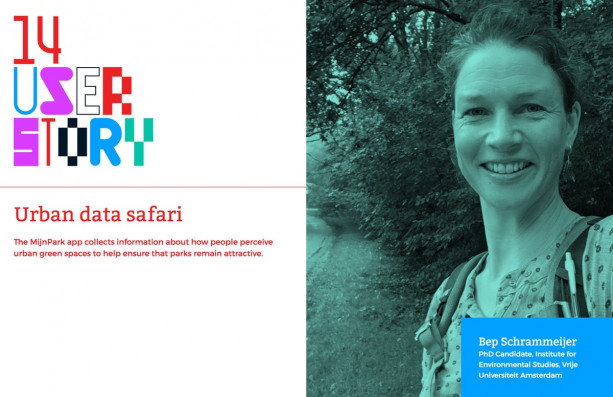Stay in the know on all smart updates of your favorite topics.
Are you interested in the experiences of others working in smart city projects and organizations? The Smart City Academy provides available knowledge about smart city projects and can help you with project development. This Smart City Academy page provides you with information and researches about the impact and conditions of smart city projects. Professors, teachers and students study the initiation, management, collaboration and scaling of smart city projects and would like to share these results with you. They do so by organizing events and masterclasses, by developing smart city tools and methodologies and by making research and outcomes accessible. You can find everything here. And the good news is.... You can add your knowledge too! Are you working on Smart City research? Please feel free to share your knowledge in the Academy section, under ‘Other research and theses’. The Smart City Academy is powered by the Amsterdam University of Applied Sciences. If you have any questions, you can contact smartcityacademy@hva.nl
A Need-based Smart City Development

Recently, Ceresus published the 2018 Smart City Development Index Report, which uses the need-based smart city development framework with data science to evaluate 12 selected smart cities worldwide. The result shows that Amsterdam and Boston were ranked at the top.
Ceresus is a data-driven marketing consultancy and we have been inventing evaluation frameworks for companies to drive business growth and for industries to make the positive change.
If you are interested in our 2018 Smart City Development Index, please write me an email for more details (cindy.ho@ceresus.co) and check out the Index here:
>>>> https://www.ceresus.co/view.php
Tampere Smart City week

In October, the City of Tampere becomes a platform for the first ever, international Tampere Smart City Week. The ultimate goal for the week is to initiate cooperation between universities, businesses and citizens alike, and to enable the creation of new smart city solutions and business models that can be scaled to other cities in the world.
The programme running from 8th - 12th October consists of several independent, yet interlinked events. During the week you can hear examples of new smart technologies and smart developments, and if you’re lucky you might even catch a glimpse of a robot or two!
But what does it really mean to be living in a smart city? How can we improve our living environment, as well as business and investment opportunities? The key, in our opinion, is the "three C's": Collaboration, Cooperation & Co-Creation, and that is what Tampere Smart City Week is all about! During the week the “Smart City Cookbook” will be published (and promoted here in the Academy), this publication from the Smart Tampere program provides guidance for Smart City Program Managers and Developers for establishing an effective smart city program framework.
The City of Tampere and its Smart Tampere program are working in close cooperation with local universities, businesses and other organizations to bring you the most exciting, diverse and high-profile week one can only imagine!
See our Facebook page for further details on the program of events and we look forward to seeing you there!
Respondents needed: Export support provided by the Gemeente Amsterdam
Dear sir or madam,
I am currently writing my thesis for the Gemeente Amsterdam (CTO office) to research how the local government can support SMEs to export their solutions for urban challenges to China. It would be highly appreciated if you could help me out by filling the following survey:
https://hva.eu.qualtrics.com/jfe/form/SV_6gpBnWkAWK5rpl3
You are:
- A company who is interested in exporting to China
- A company who is currently trying to enter China
- A company who is successfully established in China
Again, thank you so much in advance!
SDG Action Day

Iedereen kan bijdragen aan het behalen van de Sustainable Development Goals (SDGs) in 2030! De SDGs zijn 17 doelen voor positieve verandering om samen de grootste uitdagingen van deze tijd het hoofd te bieden. Dat klinkt groot en ver weg, maar begint met ideeën en initiatieven dichtbij. Wil je ook meedoen en zoek je inspiratie, samenwerkingspartners of praktische tools? Kom dan op 25 september naar de SDG Action Day in het KIT/SDG House in Amsterdam.
SDG Action Day is een initiatief van SDG Charter, KIT/SDG House, Gemeente Amsterdam en NCDO. Mediapartners zijn OneWorld (SDGNederland.nl) en Duurzaam-Ondernemen.nl
Kijk op de SDG Gateway voor het hele programma : https://gateway.sdgcharter.nl/node/388
Zero Waste Management – Transforming Cities Into Smart Cities
Take a pause from your busy life and look at our planet’s incredible sustainable natural cycle. Have you ever given a thought that our planet wouldn’t have lived billions of years without this natural cycle where the excretion of one living species tends to be another’s food – a natural zero waste management system.
We Proudly Present Our Partners: Part #4 AMS Institute

On the 21st of June we kicked off a new phase of Amsterdam Smart City. Amsterdam Smart City is an open collective of citizens, businesses, knowledge institutions and public authorities that are convinced that the changes necessary for the city and region, can only be achieved through collaboration.
More partners than ever are pooling their networks, knowledge and skills. Who are they? We will present some of them one by one. Now AMS Institute: ‘Creating value for all involved parties including citizens makes the process of innovation more complex, but leads to better results.'
What is the main reason for you to join the open collective Amsterdam Smart City?
The main reason to join the ASC coalition of the willing is to co-develop and accelerate urban innovations that create true value, matter to citizens and help solve some of the most pressing challenges in our city (and cities worldwide). By joining forces we hope to speed up the process of innovation, create more value for society and reduce the risks associated to new solutions. AMS Institute is able to contribute with cutting-edge research and knowhow to co-create urban solutions that work.
What is your ambition for the city and the Amsterdam Metropolitan Area?
We aim to help create and (re-)design the city into a sustainable, resilient, intelligent and creative city with a very high quality of life for its citizens and visitors. This is to create a prosperous future. We bring together some of the brightest minds and knowhow in technology, engineering and design to make work on the topic of urban innovation.
What do you think is the biggest challenge for the city and the region in the future?
Working towards the most prosperous, sustainable and creative region in the Netherlands, and even Europe, with a high quality of life for all of its citizens. This entitles solving challenges on sustainable energy transition, circular resource flows, accessible and affordable mobility, and the development of new digital technologies. On top of this, these solutions will need to be implemented in a meaningful and integrated way, in the context of highly densified areas with limited space availability. Solving these challenges in a holistic and citizen-centered way will be the biggest challenge, and opportunity.
How do you see the role of the residents and citizens in your plans?
Co-creating and co-developing urban solutions requires involvement and empowerment of citizens in the innovation process. This should enhance and facilitate the development and implementation of accepted solutions that work and create value for all involved parties, including citizens. This makes the process of innovation more complex, but should lead to better results and impact. How to organize citizen involvement and empowerment in uncertain innovation processes is something we, together with the broader ASC initiative, will have to learn and discover along the way.
What do you hope to work on in the upcoming years?
We hope to work on new solutions in the area of renewable energy integration in the city, Mobility as a Service, with solutions that are affordable and accessible to all, circular economy in the city, and adequate and meaningful digital technologies that improve city services and operations that enable citizen empowerment.
'We Make the City' recap
Thanks @Lotte Duursma for inviting me to share this summary of 'We Make the City', and thank you to Amsterdam for the generous welcome. Looking forward to learning more from such diverse, creative and inclusive citizens and sharing 'down-under'.
We Proudly Present Our Partners: Part #3 Pakhuis de Zwijger
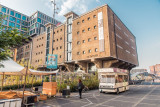
On the 21st of June we kicked off a new phase of Amsterdam Smart City. Amsterdam Smart City is an open collective of citizens, businesses, knowledge institutions and public authorities that are convinced that the changes necessary for the city and region, can only be achieved through collaboration.
More partners than ever are pooling their networks, knowledge and skills. Who are they? We will present some of them one by one. This time Pakhuis de Zwijger: ‘It is essential to make sure all Amsterdammers can decide about the future of their city.'
What is the main reason for you to join the open collective Amsterdam Smart City?
As Pakhuis de Zwijger we would like to facilitate and participate in an open dialogue on the transition of our city. We believe in the goals Amsterdam Smart City stated in the transition paths to a digital, circular and energy neutral city.
Amsterdam Smart City as a collective of cooperation is the perfect platform to achieve these goals.
What is your ambition for the city and the Amsterdam Metropolitan Area?
Pakhuis de Zwijger would always like to strengthen the dialogue between all Amsterdammers. We do this by organising events, dinners, festivals, conferences and screening films.
What do you think is the biggest challenge for the city and the region in the future?
With all the challenges of this time, like the energy transition, the unprecedented growth of the city, keeping the digital infrastructure open and accessible and the growing city moving, it is essential that we make sure that all Amsterdammers are able to participate in deciding the future of their city.
How do you see the role of the residents and citizens in your plans?
The Amsterdammers are central to achieving the goals of Amsterdam Smart City. That is why we are facilitating dialogues both in Pakhuis de Zwijger but also elsewhere in the city and through a festival like WeMakeThe.City.
What do you hope to work on in the upcoming years?
Last season we organised more than 600 events in Pakhuis de Zwijger and, together with our partners, we staged WeMakeThe.City. Next season we will certainly bring new events and a new edition of WeMakeThe.City. See our events in the calendar of Amsterdam Smart City or our website for more information.
> Let’s create better streets, neighbourhoods and cities!
Photo: Koen Smilde Photography
Banks and Retailers Are Tracking How You Type, Swipe and Tap
Interesting read in addition to Weapons of Math Destruction by Cathy O'Neil
By Stacy Cowley, NY Times, 2018/08/13.
When you’re browsing a website and the mouse cursor disappears, it might be a computer glitch — or it might be a deliberate test to find out who you are.
The way you press, scroll and type on a phone screen or keyboard can be as unique as your fingerprints or facial features. To fight fraud, a growing number of banks and merchants are tracking visitors’ physical movements as they use websites and apps.
Some use the technology only to weed out automated attacks and suspicious transactions, but others are going significantly further, amassing tens of millions of profiles that can identify customers by how they touch, hold and tap their devices.
The data collection is invisible to those being watched. Using sensors in your phone or code on websites, companies can gather thousands of data points, known as “behavioral biometrics,” to help prove whether a digital user is actually the person she claims to be.
To security officials, the technology is a powerful safeguard. Major data breaches are a near-daily occurrence. Cyberthieves have obtained billions of passwords and other sensitive personal information, which can be used to steal from customers’ bank and shopping accounts and fraudulently open new ones.
“Identity is the ultimate digital currency, and it’s being weaponized at an industrial scale,” said Alisdair Faulkner, one of the founders of ThreatMetrix, which makes fraud detection software for large merchants and financial companies. Many of his company’s customers are now using or testing behavioral biometric tools, he said.
Privacy advocates view the biometric tools as potentially troubling, partly because few companies disclose to users when and how their taps and swipes are being tracked.
Continue reading >>>
Pavnext - technological pavements

Pavnext´s solution consists of a road pavement equipment that allows kinetic energy to be extracted from vehicles and consequently reduce their motion speed without any action of the driver and without impacting the vehicle, thus promoting road safety at locations where it is required to circulate at low speed. The energy captured is then converted into electrical energy, which is produced without associated emissions and can be used in public street lighting, crosswalks, sensors, traffic lights, charging electric bicycles or even injected into the power grid. Additionally, Pavnext also provides real-time data regarding traffic and velocity, as well as generated and consumed energy, which are sent to the cloud and later used to generate reports and to optimize energy consumption in real time, promoting energy efficiency.
We are looking for new international partners that are interested in implementing pilot plants with us, to help us validate our product and reach TRL9. Please don´t hesitate to contact us if you´re interested.
Onderzoeksproject Catalyst
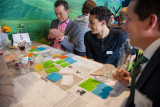
Voor dit onderzoeksproject zijn we nieuwsgierig hoe kunst kan helpen om bewoners en andere stadsgebruikers een mening te laten vormen over de slimme stad.
We doen dat in drie rondes, waarbij we steeds meer de diepte ingaan:
* De eerste ronde vindt plaats op straat; voorbijgangers worden geprikkeld om over de slimme stad na te denken door middel van kunstinstallaties en onzichtbaar theater.
* Ronde twee vindt plaats in buurthuizen; bewoners en andere stadsgebruikers worden gestimuleerd om een mening te vormen over de slimme stad.
* Ronde drie vindt plaats bij het NEMO Science Museum en brengt bewoners in gesprek met slimme stadsmakers, zoals technologieontwikkelaars en beleidsmakers.
Daarbij hebben we steeds drie vragen:
* In hoeverre helpen de kunstinstallaties en theaterstukjes om de slimme stad relevant te maken voor deelnemers? Wanneer ervaren deelnemers het als leuk en belangrijk om een mening te vormen over de slimme stad?
* In hoeverre helpen de kunstinstallaties en theaterstukjes deelnemers om de verbeelding te stimuleren? De slimme stad is voor veel mensen een abstract begrip. Hoe kan kunst helpen om de slimme stad tastbaar en bespreekbaar te maken?
* In hoeverre helpen de kunstinstallaties en theaterstukjes deelnemers om gefundeerde mening te vormen over de slimme stad? wat helpt deelnemers om niet alleen een mening te vormen, maar ook van zichzelf te begrijpen waar deze mening vandaan komt?
We onderzoeken deze vragen op een kwalitatieve manier, namelijk door middel van observaties en interviews. De publieksactiviteiten vinden plaats in Amsterdam tussen september 2018 en januari 2019.
Circular Organic Waste in Amsterdam

Circular Organic Waste in Amsterdam is a thesis project carried out in a collaboration between the UvA Faculty of Science, the Amsterdam Business School and the Van ’t Hoff Institute for Molecular Sciences (Research Priority Area Sustainable Chemistry)The aim of the project is to investigate on the potential of separate organic waste collection and treatment in improving the circularity of Amsterdam. Amsterdam wants to become a sustainable and circular city by 2050 and increase recycling to 65% of waste by 2020 (currently around 27%). In addition, in April 2018, the European Parliament has adopted the revised Waste Framework Directive which declares that all member states shall ensure that biowaste is separately collected by 2023. Therefore it is clear that the separate collection of organic waste represents both an opportunity for the city to get closer to its targets and a necessity.
Currently, organic waste is not separately collected and it is just incinerated with the residual waste. In this way, energy is produced but all the nutrients and organic matter are lost and so all the value. Other treatments, more specific for organic waste, could allow for the recycling of nutrients, the retention of the value and even the upcycling of some materials. However, the introduction of another waste stream separately collected raises organizational, logistic and transportation issues. Therefore, this research aims at analyzing various potential collection solutions that could minimize costs and environmental impact making feasible and convenient the separate collection of organic waste and different possible treatments for this waste stream.
The analysis will be based on interviews, case studies and literatures and will be performed from different perspectives in order to have a systemic vision. Parallelly also the city of Amsterdam and its different sub-environments will be analyzed in order to understand the specific needs, limitation and opportunities of each different area. Combining the results, the most successful case studies that fit best in the characteristics of the city will be selected and integrated in different sustainable business models.
The set of business models proposed will produce an overall strategy for the management of organic waste following the principles of sustainability and circular economy as much as possible.
At the same time, the research will be backed by a social analysis performed through a questionnaire in order to get data on the real perception about this issue among Amsterdam’s inhabitants. The questionnaire will also help to get data on what would be the best instruments to incentivise the separate collection of organic waste and what the biggest barriers to its realisation are.
You can access the questionnaire through this link:
Video: Citizens' initiatives in Amsterdam
On the 21st of June, the launch of the new Amsterdam Smart City took place. Our open collective, with more partners than ever, incorporates citizens in the city challenges. But many initiatives arise from residents themselves. We talked to a few of them to hear how they 'make the city'.
The video is in Dutch and has subtitles in English.
Crowdsensing Rembrandtpark
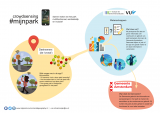
Urban green is good for your health. Urban green is good for social cohesion and Amsterdam’s city parks are being used more and more intensively. It is the City of Amsterdam’s responsibility to ensure that the parks remain attractive for everyone, but how? The Institute for Environmental Studies (IVM) at the VU is working together with the Gemeente Amsterdam on an app that collects information about how people perceive and use urban green spaces. A pilot is being conducted in the Rembrandtpark to see how such information can inform park renovations.
An example of the first results may look like this:
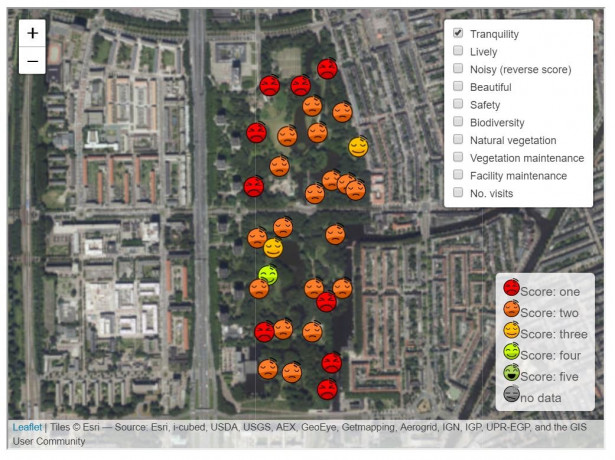
Are you visiting the Rembrandtpark? Go to http://mijnpark.environmentalgeography.nl/ to join!
Smart Stories
Check the article about MijnPark featured in our online magazine 'Smart Stories':
Amsterdam Women in Tech Regatta

JOIN US October 29 - November 2, 2018 FOR THE INAUGURAL WOMEN IN TECH REGATTA WEEK
The Regatta is a curated collection of events, workshops and conversations designed to connect women in tech to mentors, peers, resources and to the power of community. We will dwell in the realm of what’s possible, rather than simply what is.
The WiT Regatta is an inclusive event. Regardless of your area(s) of expertise, all genders and career levels are welcome and encouraged to participate.
Amsterdam is a mecca for talent, tech and dynamic non-profit organizations dedicated to making the industry more inclusive and diverse. WIT Regatta is about helping you to tap into this dynamic, talented community.
Get to work during our signature co-storming sessions, workshops, non-profit resource fair and cocktail mixers. Join captivating conversations with CEO’s, female founders and engineers.
Our week is brimming with opportunities to build your tribe and buoy your spirit, no oars required. We’ll come together to amplify careers, actualize goals, define the future of tech and blow our own minds.
Amsterdam is now joining this international event series with Seattle and Vancouver!
Our 2018 agenda includes:
To see full detailed schedule: http://womenintechregatta.com/amsterdam/event-info/itinerary/
Monday Kick off opening party– Resource reception featuring over 15 orgs from our vibrant city that support women and girls in tech- all during one night, under one roof. Connect with industry leaders who can help you find new opportunities, provide you with valuable networking and powerful insights to push your career to the next level.
Port Tracks: During the week we’re hosting over 30 breakout sessions across the city. Sessions are grouped thematically and each session will be hosted at 1 of 5 ports, as well as Circl; the MotherSHIP for the WiT Regatta. Attend all or create a personalized itinerary aligned to your specific interests.
MotherSHIP: All About You We'll be discussing self-care in toxic tech, careers and parenthood, embracing your inner power and making your flaws work for you, as well as a chance to participate in our signature Co-Storm interactive.
Port 1: Tech Mavens (Keeping you relevant in tech) We’ll be talking about everything from AI, to Crypto-Currency, to growing as a coder.
Port 2: Inclusive Culture (Allyship) The focus here is on ending gender bias in the workplace & building stronger, more diverse teams.
Port 3: Leadership We’ll hear from a diverse group of CEO’s and leaders who will discuss multi-dimensional leadership, building credibility and avoiding isolation.
Port 4: Startups Here we'll talk about side hustles, perfecting your pitch, and more with startup junkies and successful entrepreneurs.
Port 5: Career Acumen (Building relationships) Learn about how storytelling, mentorship, and meaningful connections will help you meet your career goals and win the race.
Closing Celebration: Enjoy the last day of the WiT Regatta Week at the Progressive Closing Celebrations. Participate in a variety of exciting pop in events: headshots, fashion exhibits, interactive VR, candlelight meditation, résumé review, workplace hacks and more... Connect, nibble & sip with new and old friends.
“We at The WiT Regatta passionately believe in the power of community and strive to build new connections in our ever-growing ecosystem. We will provide a powerful week brimming with opportunities to build your tribe and buoy your spirit, no oars required. Our goal is for everyone to be seen, heard and to walk away from this week with new ideas and relationships. ”
-Melody Biringer, Connection Engineer | WiT Regatta Founder and Producer
To see full detailed schedule: http://womenintechregatta.com/amsterdam/event-info/itinerary/
Full details at our website here: http://www.womenintechreagatta.com
We Make Amsterdam Resilient
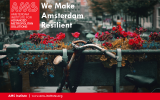
The increasing changes (in the weather, economy, politics and the socio-technical infrastructures etc.), bring next to new opportunities also new challenges and require us to rethink the way we co-create resilient cities in terms of energy, food, mobility and living.
Stay tuned via this channel for the date and time of the next event or contact me for questions via:
Need expert and/or literature on smart city architecture Amsterdam
My name is Adrian Tavaszi , I am founder of the citizen initiative for democratic smart city in Heidelberg, Germany (https://www.hd-demokratisch-digital.de/). We are looking for policies and guidelines to establish a democratic process of digital transformation. I would like to get in contact with a team member or expert from Amsterdam with some insight into the the basic opearting principles of Amsterdam smart city, the process of establishing the platform and what makes it democratic!
(adriantavaszi@gmail.com)
Thanks
Adrian
TechConnect

As part of the TechConnect action programme, a number of initiatives are being launched to increase equal opportunities in the tech sector by making related study programmes and tech jobs accessible to everyone. In practice, this means that thousands of women, people from disadvantaged neighbourhoods and owners of SMEs will be trained to become coders, data analysts, growth hackers, UX designers or tech administrators.
For more information, visit the website: <https://techconnect.city/>
Is Amsterdam ready for a "Social Credit Score"?
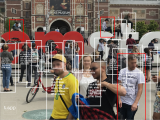
Next week, as part of We Make the City, we will be demonstrating some of the latest camera and object recognition technology and discuss the past, present and future of neighborhoods and how they relate to public data collected as a service solution vs a surveillance system.
Join us on Thursday June 21 at 2PM at Makerversity (part of the Marineterrien) for a thought provoking panel of guests including: Marc Schoneveld (DataLab), Bert Spaan (city data applications), Kim Smouter (Head of Public Affairs & Professional Standards, ESOMAR) and Tom van Arman (CITIXL).
Signup here: http://bit.ly/2JMLreQ
Why are we doing this?
The Chinese social credit system (SCS) was rolled out in 2014 and is planned to be fully implemented by 2020. That means that more than 1.4 billion Chinese either are currently or will be registered and tracked within the next few years. The Chinese government claims to use the system to both regulate the economy and individual citizen behavior by monitoring “trustworthiness”. According to the policy "It will forge a public opinion environment where keeping trust is glorious. It will strengthen sincerity in government affairs, commercial sincerity, social sincerity and the construction of judicial credibility." The Chinese government gathers information about its citizens’ including facial recognition, online behavior, spending, travel, social interactions and more. It is using this big data to provide individuals a social score that if high leads to privileges, but if low restrictions or punishment such as slower internet, restricted borrowing, travel bans, lowered status in dating apps and yes even less toilet paper in public restrooms.
This isn’t a Black Mirror episode,. Research shows that more than 90% of people rely on online reviews, so why not people reviews? While the Chinese government is using SCS to encourage trustworthy behavior, private industry is also venturing into people reviews and ratings. One such company, Peeple, released an app that allows individuals to review friends, colleagues, babysitter, dates and even enemies. The idea of this app outraged many in 2015 when it was unveiled and it has struggled to gain followers, but it could be just a matter of time before social rating systems become a way of life… and is it really so different from China’s SCS?
What are the dangers of this type of social scoring? Perhaps more importantly, what are the implications of harnessing big data from our traditional public commons? We have long had CCTV cameras in many of our big cities, including Amsterdam, for security purposes, but now technology such as machine learning and artificial intelligence (AI) can use this data, combine it with other data and the use-cases are boundless. But the question is who will decide how this data should be used and when is it in the best interest of our citizens?
Good Intentions
They say history repeats itself and I cannot help but recall what happened here in the Netherlands…back in 1936 it became mandatory for each Dutch municipality to maintain a demographic record of its inhabitants and by 1939 everyone was required to carry a persoonskaart or a personal id card that contained information deemed important by the Nederland Bureau of Statistics including gender, age, religion, pollical party, heritage or “ethnic origins.” All of the information was stored centrally using, at the time, a technologically advanced “Hollerith punch-card” system. While the Dutch government collected and held the data for the best intentions, we all know what happened when Germany invaded and gained access to all of the centrally held data and processing power.
Fast forward 82 years and we no longer need personal identity cards when most of today’s cameras can recognize our faces in public and private domains. Should we be concerned? Is there a way to embrace technological advances for the “good” and somehow mitigate the risks? The famous historian, philosopher and author Yuval Harari said in his TedTalk that he “never underestimates human stupidity.” What I think he means by this is that history repeats itself in various ways and we often think it is a completely new situation, but it is often the same problem in a new context. For example there are lots of rights we rights we 21st century consumers will wave if we have to sacrifice convenience. The disruptive technology of today is a double-edged sword with wonderful potential to solve many of our world’s most pressing problems, but that potential also can, if we do not critically assess, have horrendous consequences. We, as citizens need to take responsibility and educate ourselves about what is happening in our increasingly complicated world. Unfortunately, it is as grave as it sounds. There is no reset button. It is our responsibility to make smart choices now for our future.
Nice reads! Smart Cities: Digital solutions for a livable future
Slimme steden: digitale oplossingen voor een leefbaardere toekomst
Na een decennium van vallen en opstaan, realiseren gemeentelijke leiders zich dat ‘smart city’-strategieën beginnen met mensen, niet met technologie. Slimme steden gaan over het doelgericht gebruiken van technologie en gegevens om betere beslissingen te nemen en een betere levenskwaliteit van de inwoners te leveren.
Een rapport van McKinsey zet uiteen wat een stad slim maakt, welke technologieën interessant zijn, hoe de implementatie momenteel loopt in 50 steden over de hele wereld en hoe slimme steden ruimte creëren voor partnerschappen en deelname van de particuliere sector. (1)
Een artikel van Wired vertelt hoe Barcelona zich ontwikkelt als ‘smart city’ met primair de belangen van burgers voor ogen. (2)
Een artikel van Project Syndicate waarschuwt ervoor dat ‘smart cities’ digitaal gemarginaliseerde groepen nog verder op achterstand kunnen zetten. Het legt ook uit hoe steden dat kunnen voorkomen. (3)
2. http://www.wired.co.uk/article/barcelona-decidim-ada-colau-francesca-bria-decode
Bron AWTI nieuwsbrief 15 juni
Stay up to date
Get notified about new updates, opportunities or events that match your interests.
